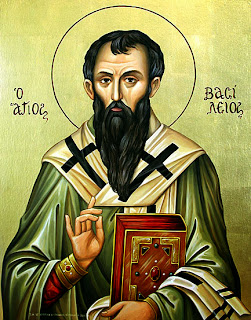 Basil of Caesarea, also called Saint Basil the Great,
(329 or 330– January 1, 379) (Greek: Ἅγιος Βασίλειος ὁ Μέγας) was the Greek bishop of Caesarea Mazaca in
Cappadocia, Asia Minor (modern-day Turkey). He was an influential theologian
who supported the Nicene Creed and opposed the heresies of the early Christian
church. His ability to balance his theological convictions with his political
connections made Basil a powerful advocate for the Nicene position.
Basil of Caesarea, also called Saint Basil the Great,
(329 or 330– January 1, 379) (Greek: Ἅγιος Βασίλειος ὁ Μέγας) was the Greek bishop of Caesarea Mazaca in
Cappadocia, Asia Minor (modern-day Turkey). He was an influential theologian
who supported the Nicene Creed and opposed the heresies of the early Christian
church. His ability to balance his theological convictions with his political
connections made Basil a powerful advocate for the Nicene position.
In addition to his work as a theologian, Basil was
known for his care of the poor and underprivileged. Basil established
guidelines for monastic life which focus on community life, liturgical prayer,
and manual labour. Together with Pachomius he is remembered as a father of
communal monasticism in Eastern Christianity. He is considered a saint by the
traditions of both Eastern and Western Christianity.
Basil, Gregory of Nazianzus, and Gregory of Nyssa are
collectively referred to as the Cappadocian Fathers. The Eastern Orthodox
Church and Eastern Catholic Churches have given him, together with Gregory of
Nazianzus and John Chrysostom, the title of Great Hierarch. He is recognised as
a Doctor of the Church in both Eastern Orthodoxy and in the Roman Catholic Church.
He is sometimes referred to by the epithet "Ουρανοφαντωρ", "revealer
of heavenly mysteries".
In Greek tradition, he brings gifts to children every
January 1 (St Basil's Day) — unlike other traditions where Father Christmas
arrives either on December 6 (Saint Nicholas Day) or on Christmas Eve (December
24). It is traditional on St Basil's Day to serve vasilopita, a rich bread
baked with a coin inside. It is customary on his feast day to visit the homes
of friends and relatives, to sing New Year's carols, and to set an extra place
at the table for Saint Basil. Basil, being born into a wealthy family, gave
away all his possessions to the poor, the underprivileged, those in need, and
children. A similar story exists for another Greek bishop, Saint Nicholas of
Myra. Over the centuries the two legends have blended together, though the
Western Santa Claus remains associated with Nicholas, while the Eastern
"Santa" is identified with Basil.
Saint Basil died on January 1, and the Eastern
Orthodox Church celebrates his feast day together with that of the Feast of the
Circumcision on that day. This was also the day on which the Roman Catholic
calendar of saints celebrated it at first; but in the 13th century it was moved
to June 14, a date believed to be that of his ordination as bishop, and it
remained on that date until the 1969 revision of the calendar, which moved it
to January 2, rather than January 1, because the latter date is occupied by the
Solemnity of Mary, Mother of God. On January 2 Saint Basil is celebrated
together with Saint Gregory Nazianzen. Some traditionalist Catholics continue
to observe pre-1970 calendars.
Source: Wikipedia.org
Read the full article here